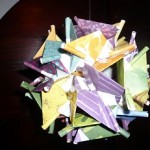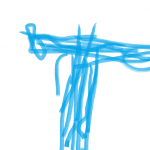During this exploration into the ways children learn, I will be introducing various arts and crafts forms to young children such as Handcraft, experiential art where the children can immerse themselves into projects while using feelings in combination with colors. Current professional texts contributing to my field study are; Reading the Brain by Stanislas Dehaene, The Arts and Human Development by Howard Gardner, The Waldorf Hand Work & Craft Curriculum from www.pyrites.org, and Adhocism by Charles Jencks and Nathan Silver. I want to teach arts and crafts in a way that creates a deep fulfilling communication between each child’s head, heart, and hands that presents the child as a whole. Crafting can be an outlet for people who have trouble expressing their feelings by speaking or writing with words. I am drawn to how the child’s mind develops as one uses his or her strongest learning style. I understand even the strongest learning styles can also be disrupted during times of distress. These learning styles are auditory, visual, and kinesthetic. The arts have been an uplifting practice throughout my own childhood. I want to ultimately share arts and crafts studies within the preschool through elementary age children in an inclusive learning environment with this contract. I have learned how to incorporate experiences from previous college work.
 Patience is not something easily found. The desire is to understand how patience can affect the ambition to pursue goals. During this single Spring quarter of field study in the program, As Poetry Recycles Neurons, the student will incorporate how the program creates a series of guides through the words of various poets and neuroscientists to illuminate a more tactile handle on life’s endeavors. Practices of seminar passes and peer reviews will continue in Monday and Tuesday sessions. During this time of study, the student will enter the realm of consciousness and dig for the origins of patience by reading some poetry and neurological-scientific articles based on patience. This study will be a branch from a tree developed in the program’s Winter quarter called T is for Therapeutic Child Crafts that involved sharing the craft of origami with others which requires patient practice itself. In a culture moving so fast, patience is not readily obtainable in some cases for some people. It is will optimism and real time journaling of life activities with others that I, the student, will try to reach and obtain the element of patience so necessary in human development to next have the persistence to create a well-constructed sturdy path to walk upon in life.
Patience is not something easily found. The desire is to understand how patience can affect the ambition to pursue goals. During this single Spring quarter of field study in the program, As Poetry Recycles Neurons, the student will incorporate how the program creates a series of guides through the words of various poets and neuroscientists to illuminate a more tactile handle on life’s endeavors. Practices of seminar passes and peer reviews will continue in Monday and Tuesday sessions. During this time of study, the student will enter the realm of consciousness and dig for the origins of patience by reading some poetry and neurological-scientific articles based on patience. This study will be a branch from a tree developed in the program’s Winter quarter called T is for Therapeutic Child Crafts that involved sharing the craft of origami with others which requires patient practice itself. In a culture moving so fast, patience is not readily obtainable in some cases for some people. It is will optimism and real time journaling of life activities with others that I, the student, will try to reach and obtain the element of patience so necessary in human development to next have the persistence to create a well-constructed sturdy path to walk upon in life.
Patience is the foundation for accomplishing a task with the highest quality. Crafting, craftsmanship, and creativity rely on patience for one to aspire to greater things and state of mind. This spring portion of my study will focus on the patience necessary for pursuing those aspirations with research about teaching methods, artists’ biographies, and neuropsychology.
ABCs and 123s – weekly log and field notes
- T week 7 logs May 17, 2013 May 13th 3 hours drafting poems, 2 hours core peer session May 14th 5 hours core, 3 hours term paper revisions May 15th 4 hours term paper revisions, 2 hours reading The ...
- T week 6 May 10, 2013 May 8th 2 hours-writing notes calculated poetics 2 hours-reading The Tough Kid Toolbox 1 hour-writing poem drafts 1 hour-posting e-Alphabet work May 9th 4 hours-piecing origami units together 2 hours-writing reverie May 10th Posting work
- T week 5 May 10, 2013 T-Week 5 Logs hours April 29th 4 hours-reading The Arts and Human Development 2 hours-core program reading Neuro writing notes 2 hours-core program Monday 1-3 draft work April 30th 7 hours-participating in Tuesday core program 2 ...
- T logs Week 9 May 2, 2013 2 hours term paper revisions 3 hours practicing origami clam folds 1 hour reading 1 hour reviewing photos
- T Week 8 April 21, 2013 2 hours term paper revisions 2 hours editing photos 1 hour reading 1 hour writing reverie
- Work Cited March 17, 2013 Works Cited Gardner, Howard. The Arts and Human Development. New York: Basic, 1994. Print. Gardner, Howard. Changing Minds: The Art and Science of Changing Our Own and Other People’s Minds. Boston, MA: ...
- T-logs February 21, 2013 T-Week 4 Log 22hrs February 1st 4 hours-reading The Arts and Human Development, Waldorf 2 hours-writing poem 3 hours-drawing February 2nd 4 hours-reading The Arts and Human Development 3 hours-drafting activities February 3rd 2 hours-teaching crafts 4 hours-writing notes and ...
- Week 5 Log January 30, 2013 Therapeutic Child Craft Leave a reply February 8th 4 hours – reading 2 hours – journaling about the relationship between the practice of arts and crafts during childhood as well as its influence on ...
Bachelardian Reverie
- T Neuro Reverie 9 May 28, 2013 Siproena Johnson As Poetry Recycles Neurons May.27.13 Neuro Reverie Week 9 Word Count 175 “Emotions course through the veins, engage the heart and the lungs, the bowels and the genitals, the muscles, the skin and ...
- Neuro Reverie w8 May 20, 2013 Siproena Johnson As Poetry Recycles Neurons 5/20/13 Seminar / Reverie week 8 Word Count 242 “It is not only that their arguments need to be located ‘in context’ as the saying goes (Tully 1988, 1993), ...
- T W6 Neuro reverie May 17, 2013 “No doubt for much of our history, these assumptions have been derived from a mixture of folk wisdom, theoretical doctrines, philosophies, and the accumulated experience of those who have exercised ...
- T W7 Neuro reverie May 13, 2013 Taking on Traffic “This is an element in a wider shift in strategies and policies in many societies toward preemption of unwanted incidents, including criminal offences.” (166, Rose, Abi-Rached) Impatience grows, ...
- T-Reverie 3 February 21, 2013 “It’s time to get up Prena!” “You need to eat before we take you to school.” Gas stove hums as I travel down the hall. The chirping clock repeats grandma’s ...
Poetry
- My Patient Friend Siproena Johnson As Poetry Recycles Neurons 5/6/13 Word Count 236 My Patient Friend Waldo looks up lovingly as he lies on my stomach. Day break is coming and he motions for me to wake. This dog can ...
- Lost in Translation Siproena Johnson As Poetry Recycles Neurons 5/6/13 Tuesday Seminar Pass W6 Word Count 197 “No doubt for much of our history, these assumptions have been derived from a mixture of folk wisdom, theoretical doctrines, philosophies, ...
- Fragments of Perception Siproena Johnson As Poetry Recycles Neurons 5/7/13 Word Count 213 Fragments of Perception Skein; a grouping layering of collected frays, Finely textured throughout the length of the plane, Threads found exposed show abrasion has given way, The now ...
- Patience Siproena Johnson As Poetry Recycles Neurons 4/29/13 Seminar week 5 Word Count 200 “He appeared to be proceeding in the direction of the water, but at each line of transition between pavement slabs, he halted ...
- T-poetry observed As They See Me
- T Reverie Siproena Johnson March.5.13 Week 9 Reverie P188 Bachelard “But can’t those times of the speaking world be reborn? Whoever goes to the bottom of reverie rediscovers natural reverie, a reverie of the original ...
- Poetry Observed
- Potential Perception Through Child’s Eyes It’s not always easy being a child, no matter how strong you’re loved or much less when unwanted There is often something in the way or literally out of ...
- T-Craft Children drive me to believe in possibilities Take in what exists while seeing what could be Children show me curiosity sustains the person to obtain and reach for new goals Children are more ...
- Time to Learn and Play Trampling of feet, tiny toddler size three shoes Delightfully energetic the child chorus approaches and grows Quickly! Such excitement cannot be suppressed! Giggles, screeches, and yays as the ambush of hugs makes headway ...
Poetry Observed
(embedded youtube or Vimeo video will go here)
Term Paper Abstract

